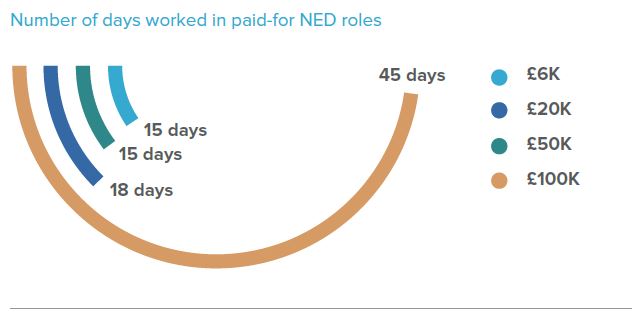 THE POSITION
THE POSITION
An NED is a member of the board of directors of a company but does not form part of the executive team. According to the UK Corporate Governance Code: “As part of their role as members of a unitary board, non-executive directors should constructively challenge and help develop proposals on strategy”.
The code adds: “Non-executive directors should scrutinize the performance of management in meeting agreed goals and objectives and monitor the reporting of performance.
They should satisfy themselves on the integrity of financial information and that financial controls and systems of risk management are robust and defensible. They are responsible for determining appropriate levels of remuneration of executive directors and have a prime role in appointing and, where necessary, removing executive directors, and in succession planning”.
Be aware that being an NED is about listening, encouraging and steering the executive team into the right course of action without prescribing that course of action; it’s about influence.

Communications leader who currently holds an NED role
The range of NED roles is extensive. They run from being a trustee of a small charity to holding the Senior Independent Directorship or deputy chairmanship post for a large FTSE100 firm. Time commitments can range from a pro bono trustee post working under 10 days a year to an NED position for a FTSE100, working up to a couple of days a week. Remuneration differs accordingly. Charity trustee posts are unpaid, public sector day rates are circa £250 to £500 (annually around £6,000 to £25,000) whilst day rates at FTSE350s are around £1,000 to £1,500. FTSE100 board roles can pay around £2,700 per day.
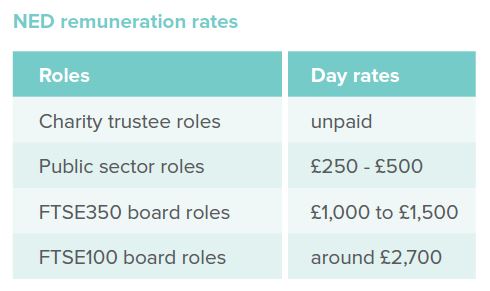
It is clear that a senior communicator taking on a NED role while still in a full-time post is not going to transform their finances. Those that choose to go plural will experience a significant drop in earnings, but that may be after their executive career is over in any case. The NED recruitment process also varies.
Usually NED positions for large listed FTSE organisations are handled by the board practice of a generalist executive search firm, or by specialist board recruiters. The public sector has to advertise its NED positions, making these roles easier to find. NED roles in start-ups or smaller firms are often found via the founder or a founder network.
NED SKILLS AND COMPETENCIES
The specific background, skills and experience required of an NED depend on multiple factors. Some talents are generic, such as the ability to listen and process a large amount of information quickly. But quite often a role depends on the qualities of the current board members; the particular company concerned (i.e., whether b2b or b2c, international or domestic, product or service based, private or publicly owned, regulated or not); and its strategy and plans for the future.
Despite the variance in these roles, we were keen to explore, both with chairmen and communications directors, what skills, experiences and functional backgrounds they felt were generally most valuable for NED positions. The chairmen look for individuals to complement and supplement the skills and experience they have on their current board, balancing by industry, function, competency and cultural perspectives. Experience, gravitas and connections are critical.
It’s not a NED thing, it’s a board thing. It’s how everyone on the board complements each other. It’s about the make-up of the boards in its entirety, not the individual.

Chairman
I look at what our organisational needs are likely to be in five to ten years, identify what issues and challenges we will likely face, and therefore what experience and functional expertise we need at board level. And then I look at the current experience we have within the board (both at exec and non-exec level) to see where the gaps are likely to be.

Chairman
A balanced board
Chairmen told us that the make-up of a board must reflect the diversity of its stakeholders. They require a board that contains a wide range of individuals with different experiences and backgrounds. Hiring NEDs was also about not only meeting the organisation’s current needs, but looking to the future requirements of the business as well.
Industry experience
Whilst industry experience is by no means a pre-requisite for an NED role, it is more important in some sectors than others. Companies in manufacturing sectors or in heavy industrials as well as financial services tend to prefer some NEDs to have previous sector experience. Whilst industry knowledge can be useful, most chairs prefer a mix of industry experience around their board. They favour NEDs from affiliated industries as they don’t hire from direct competitors to avoid potential conflicts of interest. Individuals that have worked in highly regulated organisations where there are pressing ‘licence to operate’ issues were ranked highly by chairmen running organisations that have similar regulatory pressures.
Functional experience
Functional experience is not required from an NED as this is represented at an executive level, but there are certainly some functions that produce more NEDs than others. The key priority of chairmen remains to ensure expert insight into the traditional business functions such as finance, marketing, and operations. Support functions, such as corporate affairs or human resources tend to be ranked as a much lower priority.
Experience in finance, operations and even HR is always going to trump corporate affairs when it comes to NED roles. Communications leaders need to emphasise business critical skills like crisis communications ahead of wider reputation management to become a NED.

Communications leader

We were keen to determine where corporate affairs ranked in comparison to other executive committee functions and asked interviewees – both chairmen and communications directors – which functional heads they thought generally had the most relevant skills and experience for NED roles.
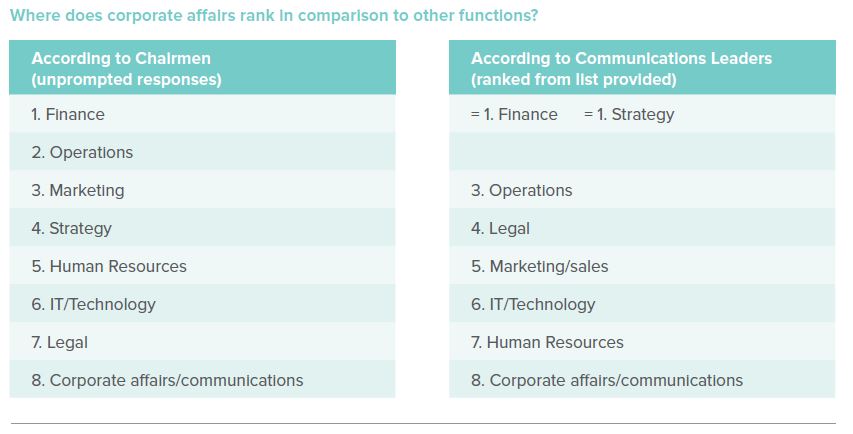
While the table above is not a direct comparison (we asked communications leaders to choose from a list provided, and chairmen provided their responses unprompted), responses were very similar, with identical rankings at the top and bottom. Leaving aside the CEO (which chairmen ranked as the most likely to secure an NED role) those coming from the finance function, most likely the chief financial officer, were rated highest. Corporate affairs directors came in at the bottom of both rankings. The result emphasizes not only the chairmen’s scepticism at their NED abilities – but communicators’ doubts too.
Finance featured as the function most likely to produce NEDs in both lists. Firms are generally complex, long term businesses and so there is always a need for financial skills on a board, plus financial experience is needed to chair and populate the board’s audit committee. Operations was the runner-up discipline on both lists. Operational experience is particularly sought-after in complex manufacturing organisations where boards need people who have experience of front line operations as well as direct customer engagement.
The strategy function came in at =1 and 4; it was ranked much higher (at=1) by communications leaders than by chairmen(4). This discrepancy could be attributed to different business models, some of which rely much more heavily on strategists that others. Additionally, chairmen told us that whilst one of the key roles of the board is honing and buying into strategy, many strategy heads in organisations are ex-management consultants who would not be considered as suitable candidates for NED roles. However, there are notable exceptions among the ranks of FTSE NEDS.
Why did corporate affairs come in bottom of both piles? Numerous reasons: the negative perception of the function, its perceived lack of intellectual rigour and the absence of commercial acumen. We explore these points further in Section 5.
But why do communicators rank their discipline below all the others? We put this somewhat surprising result down to two factors. The first is a lack of confidence among communicators that they have the necessary skills to compete for roles with fellow executives. There must also be some resignment to the fact that NED appointments follow a standard formula and communicators’ faces rarely seem to fit.
I think we need to accept that there are some roles that easily translate into NED posts and some that don’t. Communications, general counsel (legal) and human resources (HR) tend to be difficult to segue into NED roles, albeit that HR is seen to be a somewhat broader church and more linked to the business so some human resources directors do break-through in the NED world.

Chairman
International experience
For organisations with an international footprint, overseas experience is particularly valuable, especially if it is planning to enter new international markets. Sometimes an NED with specific country or regional experience can be hired well in advance of eventual expansion to help smooth the way.
NED experience
This is the ultimate Catch 22. Most chairmen prefer to appoint a NED that has already had experience in a similar board role and who therefore knows the ropes. For example, when hiring onto a FTSE board, they would favour a candidate who had previously been a FTSE NED or a FTSE executive rather than an individual that had been an NED in say a charity or in the public sector.
NEDs need to use their wisdom to read a lot of board papers and then be able to ask relevant, pertinent questions. It’s about strengthening the organisation whilst supporting – rather than undermining – the executives. It’s about providing high level oversight, challenge and support to the business.

Chairman
Some NEDs don’t say much but when they do it’s worth its weight in gold.

Chairman
You want a handful of brave challenger types, but not too many as otherwise the board becomes a counter-productive jungle that’s incapable of making a decision.

Chairman
Personal qualities
For chairmen, the competencies and personal qualities of an NED are critical, particularly as a counter balance to their existing NEDs. They want confidence, self-motivation, credibility and authority…. AND:
Intellect. This was one of the top attributes that chairmen identified as being crucial in a NED. NEDs need to assimilate a lot of information quickly, be able to dip into complex issues and get to the nub quickly and effectively. They need the intellect to be able to focus on what’s important and identify the right questions to ask.
Bravery. A number of chairmen flagged bravery as an important attribute, including those that are willing to put their head above the parapet and challenge orthodoxies. A board can be a tough environment particularly when NEDS don’t know the subject matter too well and there can be a danger that the board drifts into ‘groupthink’. Having one or two challengers around the table ensures that the board is vibrant and dynamic yet not too combative.
Excellent interpersonal skills. To include strong relationship-building abilities, diplomacy, first-rate verbal and non-verbal communications skills, good networking skills.
Cultural fit/diversity
Chairmen pointed out that it is essential that NEDs are able to fit into the organisation’s culture and crucial that they embody the same values as the organisation. They also noted that diversity was increasingly important, not only in terms of gender and ethnicity but also in nationality (particularly for international companies), as well as in age.
One chairman we spoke to is keen to hire ‘a youngster’ in their late 30s to early 40s who can see the same way as future consumers and reflect that back in the boardroom.
A lot of what’s needed in the boardroom is common sense. You don’t need to know everything but you do need to be a good fit. It’s about chemistry, curiosity and courage.

Chairman
HOW COMMUNICATORS FARE
What they want
All communications leaders that participated in this research are keen to secure an NED role with some 85% being either extremely or very interested. They cited a number of reasons why, including opportunities to:
- influence at a senior level;
- gain exposure to a wide range of industries and issues;
- enjoy career progression beyond corporate communications;
- be more valued at executive level;
- ‘go plural’ by holding a number of different non-executive roles.
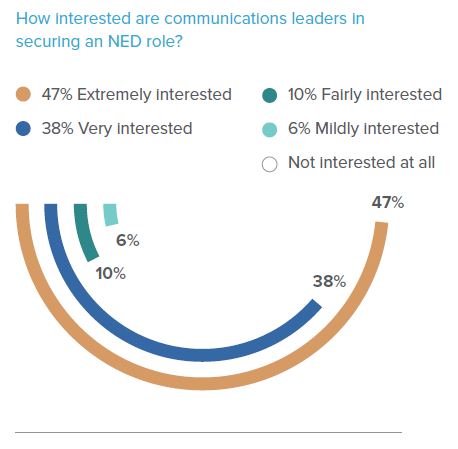
What they have got
While 100% of communications leaders we polled are interested in securing an NED role, just 20% currently hold (or previously held) one. Those that have held NED roles have found them in a wide range of industries with no one sector predominating.
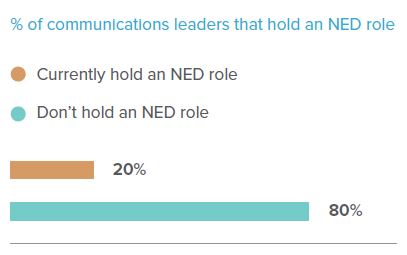
Of the communications leaders who hold, or previously held NED roles, a vast majority (97%) are in pro bono, unpaid positions. These tend to be in the arts (theatre, opera, performing arts) as well as in the charity sector. Education (school governor, trustees), tourist boards and healthcare (public & private healthcare authorities) also feature.
Paid-for NED roles for communications directors are in short supply. Just over 3% of respondents hold remunerated NED positions. Not surprisingly these are all in the private sector and span the science, engineering, utilities, reputation analytics and food manufacturing industries.
Annual remuneration levels range from £6,000 (for an NED post in a property company), £20,000 for NED work for a reputation analytical firm, to £50,000 for a listed sports firm, and £100,000 per annum for a listed oil & gas company.
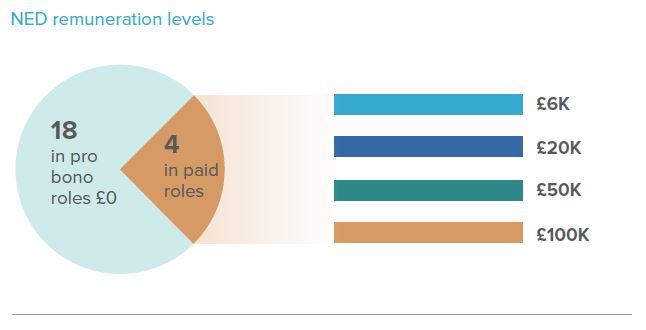
Whilst there is a clear correlation between remuneration and days worked at the top end of the scale, with the most highly paid NED (£100,000) working for around 45 days per year, there is little connection between fees paid and days worked at the lower end. Whilst this is just a small sample, it does show the wide range of fees on offer for NED roles, in these instances from £330 per day to over £2,200 per day. It is clear that most are not in it for the money.
